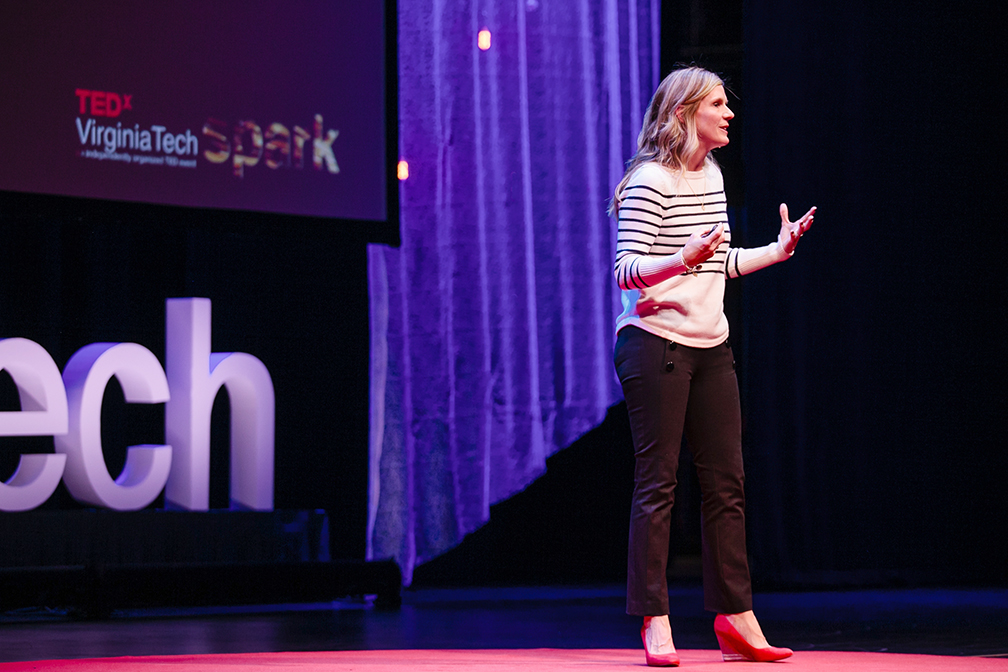Center for Autism Research to Host Symposium on Technology, Education, and Clinical Care for Autism
September 5, 2017

The Virginia Tech Center for Autism Research will host a one-day symposium Sept. 15 in Falls Church, Virginia, bringing experts on autism spectrum disorder from Blacksburg to the National Capital Region.
The event is geared toward scientists, professionals, educators, students, and health-care providers in the field of autism, and individuals with autism and/or their family members. More than 3 million Americans are affected by autism, said Angela Scarpa, center director and an associate professor with the Department of Psychology, part of the College of Science.
The symposium will be held from 7:30 a.m. to 1:30 p.m at the Falls Church Fairview Marriott. Attendance is free. Talks and presentations will focus on autism research from the fields of biomedical and imaging, technology, education, and clinical translational care, with guest speaker Alison Singer of the Autism Science Foundation closing out the event.
“My hope is to connect with the community in Northern Virginia and disseminate the autism work we are doing at Virginia Tech,” Scarpa said. “We hope to see anyone who has an interest in improving the lives of people with autism. We want them to walk away with a sense of inspiration, that although autism is quite complicated and many groups are underserved with respect to evidence-based care, we can work together from multiple perspectives to understand the needs and find ways to support or treat autism so that people with autism have every opportunity to lead the lives they want.”
This is the third time that Virginia Tech has hosted a public seminar in the National Capital Region focusing on novel autism research and other information about its autism center. The first seminar was held in 2014, the same year the U.S. Centers for Disease Control and Prevention released startling new data on the growing prevalence of autism: That one in 68 children has some form of autism spectrum disorder, a 123 percent increase during the previous decade. A report in 2016 showed those numbers as unchanged.
Virginia Tech speakers, in addition to Scarpa, include Julie Dunsmore and John Richey, both associate professors of psychology; Denis Gracanin, an associate professor in the College of Engineering’s Department of Computer Science; Yeonwoo Lebovitz, a graduate student in Virginia Tech’s Translational Biology, Medicine and Health program; and Amy Azano, an assistant professor in the School of Education, Anisa Zvonkovic, department head of human development, and Carolyn Shivers, an assistant professor of human development, all in the College of Liberal Arts and Human Sciences.
According to the Autism Science Foundation, Singer is the mother of a child with autism and has served on the national Interagency Autism Coordinating Committee, which helps guide federal spending for autism research. She also is involved with the Yale Child Study Center, the Marcus Autism Center at Emory University in Atlanta, and the Centers for Disease Control and Prevention’s Center for Birth Defects and Developmental Disabilities.
Scarpa also is the mother of a child with autism, as is Azano. They have experienced firsthand the trials of obtaining needed services and both the challenges and joys of raising a child on the spectrum. In 2016, Azano gave a well-received talk on the struggles of providing care for youth with autism in rural America at TEDxVirginiaTech. Azano will revisit the topic in a new talk at the Sept. 15 symposium.
Sponsoring the event for the third time is Jerry Hulick, owner and a senior special care planner with The Washington Group Special Care Planning Team and a 1973 political science alumnus of Virginia Tech. He also is a member of the College of Science Dean’s Roundtable Advisory Board and the College of Liberal Arts and Human Sciences Roundtable. Before last year’s event, Hulick said the symposium is designed to highlight Virginia Tech’s leading research into autism and “promote collaborations beyond Blacksburg, open doors for further understanding of autism, and bring about opportunities not yet imagined.”
Written by Steven Mackay





